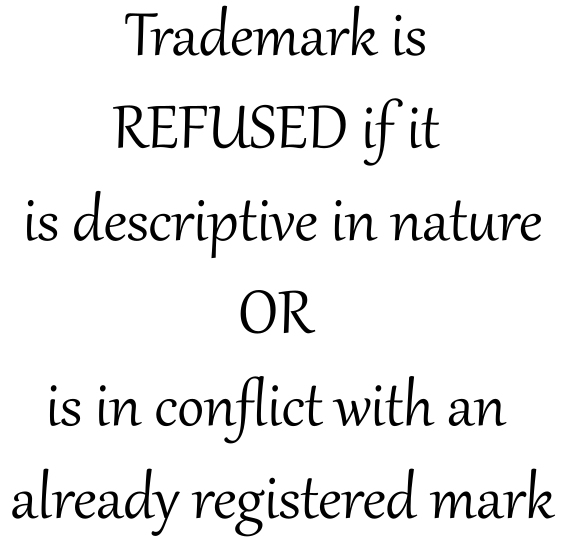Trademark Refusal in India – A complete guide
A trade mark application is filed in a specific class for specific goods and/or services. Shortly after that the application proceeds to examination, during which the Registrar of trademarks may call for certain additional requirements for registration, refuse the application or accept it unconditionally.
The trademark refusal in India is usually under the ABSOLUTE grounds or RELATIVE grounds as below:

Absolute grounds: The refusal of a trademark is often under Section 9(1) (a) of the Trade Marks Act 1999, if the mark is descriptive or non-distinctive as such that it is not capable of distinguishing the goods and services of one business from others, or is something that indicates kind, quality, quantity, intended purpose, values, geographical origin of the product.
Relative grounds: The refusal of a trademark can also be under Section 11 (1) of the Trade Marks Act, 1999, if the mark is identical with or similar to earlier marks in respect of identical or similar goods and services, and due to this there exists a likelihood of confusion on the part of the public.
Information presented here also applies to International Trademark Provisional refusal in India
Why Can a Trademark Be Refused?
The examination report/Refusal order contains the reason for the refusal along with the conflicting marks if any.
There are two main reasons why a trademark might be refused in India: absolute grounds and relative grounds.
There’s an exception here too: If there’s honest concurrent use of the trademark, the Registrar might allow registration.
Absolute Grounds:
Section 9 of the Act lays down scenarios in which the trademark will not be registered as elaborated below:
The refusal of a trademark is often under Section 9(1) (a) of the Trade Marks Act 1999, if the mark is descriptive or non-distinctive as such that it is not capable of distinguishing the goods and services of one business from others, or is something that indicates kind, quality, quantity, intended purpose, values, geographical origin of the product.
- Marks which are devoid of any distinctive character. Such marks are not capable of distinguishing the goods or services of one person from those of another.
- Marks which which serve in trade to define the kind, quality, quantity, intended purpose, values or geographical origin of goods or services rendered.
- Marks which have become customary in the current language or the established practices of the trade.
- Marks which deceives or cause confusion to the public.
- Marks which are likely to hurt the religious sentiments of any class or sections of citizens of India.
- Marks which contain scandalous or obscene matter.
- If the usage of the trademark is prohibited under the Emblems and Names (Prevention of Improper Use) Act, 1950.
- Marks which consist of the shape of goods which result from the nature of goods themselves.
- Marks which consist of the shape of goods which is necessary to obtain a technical result.
- Marks which consist of the shape which gives substantial value to the goods.
Exception: The trademark shall not be refused registration if the mark has acquired a distinctive character as a result of prolonged use or is a well-known trademark before the date of application for registration.
Relative Grounds:
Your trademark could be refused if it’s identical or very similar to an earlier registered mark, especially if both are for similar goods or services. This is to avoid confusion among the public.
Section 11 of the Act provides relative grounds for objection/refusal of registration. This section provides exceptions to the grounds of refusal. If the exceptions are complied with, then the trademarks under section 11 can be registered.
The refusal of a trademark is under Section 11 (1) of the Trade Marks Act, 1999, if the mark is identical with or similar to earlier marks in respect of identical or similar goods and services, and due to this there exists a likelihood of confusion on the part of the public.
Section 11(1) states the following grounds for objection–
- Trademarks which are identical with similar goods or services.
- Trademarks which are similar of earlier trademarks with identical goods or services.
Exception: If there is an honest concurrent use of the trademark, the Registrar of Trademarks may allow the registration.
Section 11(2) states the following grounds for objection –
- Trademarks is identical with or similar to an earlier trade mark; and with different goods and services but
- Which would be likely to take unfair advantage of the well known similar or identical earlier trademark in India.
Section 11(3) states the following grounds for objection –
- The usage of the trademark is prevented by the law of passing off protecting an unregistered trademark used in the course of trade.
- The usage of the trademark is prevented by virtue of law of copyright.
Section 11(4) provides exceptions to the refusal –
Section 11(4) provides an exception that the trademarks shall not be refused registration if the the proprietor of the earlier trade mark or other earlier right consents to the registration or unless an objection is raised in opposition proceedings by the proprietor of the earlier trademark.
What Happens After Refusal?
When a trademark is refused, you’ll receive a notification that explains the reasons and lists any conflicting marks. If this happens, you have a chance to respond. You’ll need to file your response within one month of receiving the examination report. This response should include your arguments as to why your mark should be registered despite the refusal.
If the Registrar still isn’t convinced, you can apply for a review of their decision. This must be done within one month, using Form TM-M, and accompanied by a statement explaining your grounds for the review. If the review is dismissed, you can appeal to the Intellectual Property Appellate Board (IPAB) within three months.
In essence, trademark refusal isn’t the end of the road. With the right arguments and documentation, you can challenge the refusal and still secure registration for your mark.
Rule 119 of the Trade Marks Rules 2017 states that ‘An application to the Registrar for the review of his decision under sub-section (c)of section 127 shall be made in Form TM-M within one month from the date of such decision or within such further period not exceeding one month thereafter as the Registrar may on request allow, and shall be accompanied by a statement setting forth the grounds on which the review is sought’.
Section 127 in The Trade Marks Act 1999 states the Powers of Registrar and sub clause (c) of the Section states that ‘the Registrar may, on an application made in the prescribed manner, review his own decision’.
Further, on dismissal of review petition, the applicant also has an option of filing an appeal before the Intellectual Property Appellate Board (IPAB) within 3 months of the dismissal.
How can we help you overcome trademark refusal?
We’ll carefully review the documents provided by the Indian Trademarks Office that led to the provisional refusal of your case. After that, we’ll prepare and file a response to address the objections. It’s important to note that this response must be submitted within one month from the date you received the refusal notice.
The refusal notice typically includes a list of conflicting marks, and we’ll also analyze these to assess the chances of successfully registering your trademark. We’ll provide you with our professional opinion on the best course of action moving forward.
Attorney fee for overcoming a trademark refusal in India
Action based fee
- Attorney fee for preparing and filing a response to trademark refusal in India
- Additional fee for responding to office actions
- Additional fee for preparing evidences and arguments
- Additional fee for attending hearings with the examiner
Capped Flat fee
- Attorney fee for preparing and filing a response to trademark refusal in India
- No further fee for responding to office actions
- No further fee for preparing evidences and arguments
- No further fee for attending hearings with the examiner
You may instruct us by writing an email to info@bhagnari.com or by filling up the contact form provided below.
Written by Mahesh Bhagnari, Patent & Trademark Attorney in India.
I, Mahesh Bhagnari, am the Managing Principal of the firm:
- I am an Attorney at Law with Bar Council Registration № MAH/1574/2003.
- I am a licensed Patent attorney in India and Design attorney in India with Registration № IN PA 1108.
- I am a licensed Trademark attorney in India with Registration № 10742.
- I have more than eighteen years of professional experience working in the field of Intellectual property.

Contact form
+91.9860588440
Make a phone call
info@bhagnari.com
Write us an email
